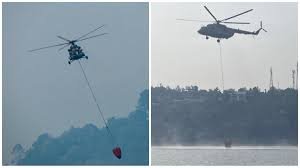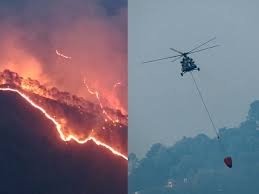IAF Conducts Bambi Bucket Operations to Combat Forest Fires in Uttarakhand
In a proactive measure to combat the escalating forest fires in Uttarakhand, the Indian Air Force (IAF) has initiated Bambi Bucket operations. These operations involve the use of specially designed helicopters equipped with Bambi Buckets to douse the raging flames. With Uttarakhand being a region prone to forest fires, especially during the dry summer months, such swift and strategic actions are crucial to mitigate the damage caused by these natural disasters.
The IAF’s involvement in combating forest fires underscores the importance of interagency coordination and swift response mechanisms in dealing with environmental emergencies. The utilization of Bambi Bucket operations demonstrates the innovative approaches adopted by the armed forces to address multifaceted challenges, beyond their conventional roles.
This initiative not only highlights the IAF’s commitment to environmental conservation but also showcases their versatility in executing humanitarian missions. By actively engaging in firefighting efforts, the IAF exemplifies its dedication to safeguarding lives and ecosystems, contributing significantly to disaster management efforts in the country.
As the frequency and intensity of forest fires continue to rise globally due to climate change, the proactive measures undertaken by the IAF serve as a beacon of hope and inspiration for other regions grappling with similar challenges. Moreover, it emphasizes the need for proactive measures, community participation, and technological interventions in mitigating the adverse effects of climate change-induced disasters.

Why this News is important:
Swift Response to Environmental Emergencies In the face of escalating forest fires in Uttarakhand, the Indian Air Force’s initiation of Bambi Bucket operations is of paramount importance. This proactive measure underscores the urgency of addressing environmental emergencies and highlights the critical role played by the armed forces in disaster management.
Demonstration of Interagency Coordination The involvement of the IAF in combating forest fires emphasizes the significance of interagency coordination in dealing with multifaceted challenges. Such collaborative efforts between defense forces and civilian authorities are essential for effective disaster response and mitigation.
Commitment to Environmental Conservation The IAF’s engagement in firefighting efforts reflects its commitment to environmental conservation. By utilizing innovative approaches like Bambi Bucket operations, the armed forces demonstrate their dedication to protecting ecosystems and safeguarding biodiversity.
Adaptability and Versatility of Armed Forces The IAF’s involvement in humanitarian missions like firefighting showcases its adaptability and versatility beyond conventional defense roles. This underscores the armed forces’ readiness to address diverse challenges and contribute to national development and security.
Global Relevance in Climate Change Mitigation As climate change exacerbates the frequency and intensity of natural disasters worldwide, the IAF’s proactive measures in Uttarakhand have global relevance. They highlight the importance of proactive strategies, technological interventions, and community participation in mitigating climate change-induced disasters.
Historical Context:
In recent years, Uttarakhand has been increasingly susceptible to forest fires, primarily due to a combination of environmental factors such as dry weather conditions, high temperatures, and human activities like deforestation and encroachment. These fires not only pose a significant threat to the region’s biodiversity but also endanger human lives and livelihoods, especially those dependent on forest resources.
The devastating forest fires of 2016, which engulfed large swathes of forest cover in Uttarakhand, served as a wake-up call, highlighting the urgent need for enhanced preparedness and response mechanisms. Since then, various stakeholders, including government agencies, NGOs, and local communities, have been working towards mitigating the impact of forest fires through measures such as fire line clearance, controlled burning, and awareness campaigns.
Against this backdrop, the Indian Air Force’s deployment of Bambi Bucket operations marks a significant milestone in the region’s firefighting efforts. It builds upon previous experiences and underscores the collective resolve to address the recurring challenge of forest fires in Uttarakhand.
Key Takeaways from “IAF Conducts Bambi Bucket Operations to Combat Forest Fires in Uttarakhand”:
| Serial Number | Key Takeaway |
|---|---|
| 1 | Indian Air Force (IAF) is conducting Bambi Bucket operations to combat forest fires in Uttarakhand. |
| 2 | Bambi Bucket operations involve the use of helicopters equipped with specially designed buckets to douse flames with water. |
| 3 | The initiative highlights the IAF’s commitment to environmental conservation and humanitarian assistance beyond its conventional roles. |
| 4 | Interagency coordination and swift response mechanisms are crucial in addressing environmental emergencies like forest fires. |
| 5 | The proactive measures undertaken by the IAF underscore the need for innovative approaches and collaborative efforts in disaster management and climate change mitigation. |
Important FAQs for Students from this News
1. What are Bambi Bucket operations?
Bambi Bucket operations involve the use of helicopters equipped with specially designed buckets to collect and drop water onto forest fires, aiding in firefighting efforts.
2. How does the Indian Air Force contribute to combating forest fires in Uttarakhand?
The Indian Air Force contributes to combating forest fires in Uttarakhand by conducting Bambi Bucket operations, deploying helicopters to douse the flames with water.
3. Why is Uttarakhand prone to forest fires?
Uttarakhand is prone to forest fires due to various factors such as dry weather conditions, high temperatures, deforestation, and human encroachment into forest areas.
4. What is the significance of interagency coordination in addressing environmental emergencies like forest fires?
Interagency coordination is significant in addressing environmental emergencies as it facilitates the pooling of resources, expertise, and efforts from various stakeholders, leading to more effective disaster response and mitigation.
5. How do proactive measures like Bambi Bucket operations contribute to climate change mitigation?
Proactive measures like Bambi Bucket operations contribute to climate change mitigation by helping to contain and extinguish forest fires promptly, thereby reducing carbon emissions and preserving forest ecosystems.
Some Important Current Affairs Links

















